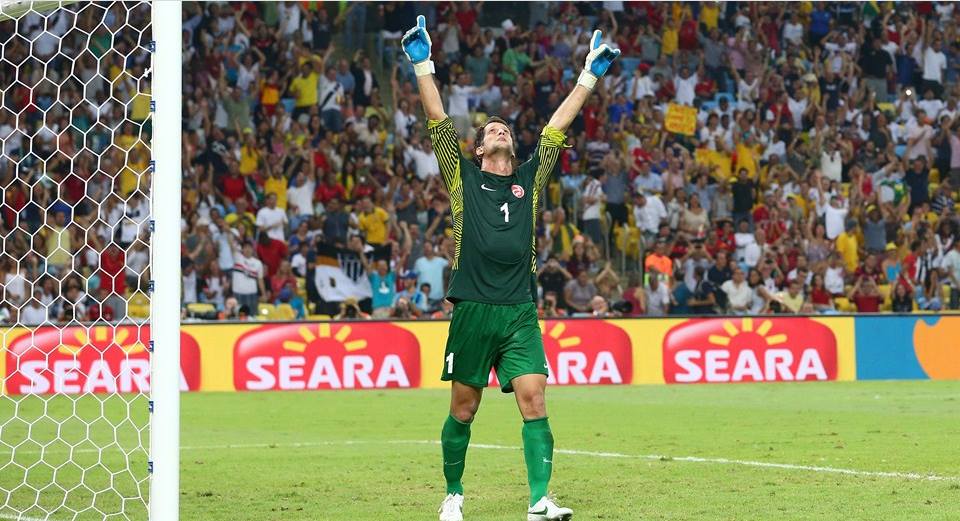Three matches, three heavy defeats. 24 times watching the ball go into their net, for one single goal scored throughout the whole competition. Back home, however, there’s nothing but fond memories, smiles and absolute pride for the Tahitian players who took part in their national team’s memorable run in 2013 Confederations Cup. Yes, memorable: it was a first for Tahiti playing – and scoring! – in an official tournament outside their continent. A colossal feat for a semi-professional team with no experience at this level, in which they saw themselves going head-to-head against African powerhouse Nigeria or World champions like Uruguay and Spain.
The exceptional nature of their achievement was all they needed to have almost full support from the stands, wherever they played in the tournament. And the Tahitian always made clear that the feeling was mutual, displaying their gratitude for all the unforgettable moments they had the chance to live. One in particular caught attention: a part-time teacher picked by the coach to stand between the posts against the feared Spaniards, mighty European champions, on the legendary pitch of the Maracana. But still, even after being beaten in 10 occasions that game, he finished the game looking triumphant. After the competition, he was gentle enough to concede this interview, in which he spoke about what his experience was like playing in such a tournament, the popularity of football in Tahiti and the challenges the sport faces in French Polynesia, as well as other aspects of the social and political structure of this tiny island, embraced by the Indian Ocean – and of course, by all Brazilian fans.
How popular is football in Tahiti? What did this Confederations Cup mean to Tahitian (professional) football, now and in the future?
Football is quite popular here. FTF is the federation that has the most licensed players. However, watersports have big success over here, like surf or Va’a (Tahitian traditional canoe). The Confederations Cup did not mean much to the people here… even for lot of people in the federation! We, the players, were aware of how important this competition was. But we did not know how big it was, and how big you live it in Brazil! This competition has made some people conscious of how big is the gap between us and the world class football. But it gave good points of work to get things better, like equipments (quality fields), training methods, mentality, etc. Talking about profesionnal football is not really realistic here because the market for football is not big enough. Only 280.000 people live in French Polynesia, 100.000 in Tahiti. And the companies don’t want to put lot of money in football – can they, regarding the economic crisis we are facing here? So we have got to be more profesional in the way that we live it. But more in terms of mentality than in terms of economic capacity.
What is the structure of league football in Tahiti?
There are only 2 divisions here. 1st division has 2 rounds, a regular one that qualifies teams for the 2nd one, the play-offs.
You probably could not be happier following this Confederations Cup with your nation in Brazil, but at club level, how is your career going?
With my club, we got eliminated from the OFC Champions League after the pool phase, and did not qualify for the semi-final for just few things. It has been really frustrating because my team was really competitive, the atmosphere in the team was really nice. In the words of all the teams we played, even the one that won the Cup, we had the best football and we deserved to go to the final.
How would you describe the Tahitian society, its cultural values, and way of living? And what are the challenges you see for the future?
Tahiti has lived under artifical economy, due to the financial helps given by France because of the nuclear bomb tests, and did not build enough real economic system. So since the helps are lower, added to the world economy crisis, we’ve faced difficult times. About 10 years ago, for the 1st time we started seeing poorer, even homeless people. However, we have middle and high class people too. Life is still really good here, quality is still really good. Religion is really powerfull here, and political and society decisions too much have to deal with the religious power – people are mainly protestant and catholic. Lots of people are really under the influence of the churches here. The biggest challenge for the country is to become more attractive for tourists. Tourism is our 1st resource. We’ll have also to try to produce more and import less. We’ll have to keep the education system strong, and find a solution to keep the health system (but it costs a lot).
You work as a teacher too. What are your thoughts about Education in Tahiti?
The Education is really good here. We have the French model, with local specificities in the school programs (like in Geography or History for ex. Or in sport, we teach va’a). A lot of teachers come from France, have a 4-years contract and go back.
How was the experience of playing against the likes of David Villa and Fernando Torres, and how do you think this experience will impact your career?
Playing againts the best has been incredible, like a dream coming true. But most of it it has been playing in such a historical stadium, the Maracana, with that amazing crowd, always supporting us… I cannot forget that. I don’t know if the Cup will have any impact on my career, as I’m 30, and don’t think I put much interest on foreign clubs. But as a player, I will feel stronger and more confident.


Leave a Reply